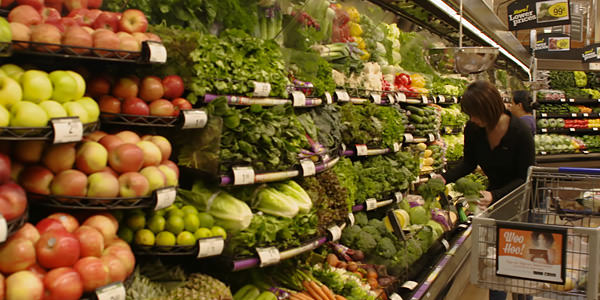
Kroger explains food deflation
Shares of Kroger Co. slid seven percent last Thursday after the company indicated that lower-priced dairy, meat and seafood products were causing its overall sales growth to slow. Michael Schlotman, CFO and EVP, was prompted to explain to analysts in detail that food deflation wasn’t “fundamentally a bad thing.”
Same-store sales, which exclude fuel, are expected to grow between 2.5 to 3.5 percent in 2016, down from 5.5 percent seen in 2015.
Identical store sales in the fourth quarter were also slightly worse than forecast, although part of the blame was placed on a shift of the Super Bowl into February and fewer snowstorms this year versus last year.
The share drop came despite earnings in the quarter coming in above Wall Street’s consensus targets. The core business in 2016 is also still expected to expand in line with its long-term EPS growth rate of eight to 11 percent.
On a conference call, Mr. Schlotman noted that real growth, or identical supermarket sales less inflation, was up over six percent in the fourth quarter and said a “deeper dive” is required to understand how price movements help and hurt earnings.
For instance, while meat saw deflation of about five percent, the decline made the category affordable for more customers, driving higher volumes and gross profits. Milk was also a drag on identical stores sales last year but generated “good profit” overall for the company.
On the other hand, produce saw inflation of nearly six percent in the quarter but Mr. Schlotman said that wasn’t “a good thing” as it pointed to issues around shortages and poor quality.
CEO Rodney McMullen added that inflation is expected to be lower in the early part of the year and higher in the later part.
“When you look back over the past several years, we’ve had periods of high and low inflation,” said Mr. McMullen. “And we’ve shown that regardless of the environment, we consistently do our job to manage through it and maintain relative pricing.”
- Kroger Reports Fourth Quarter and Full Year 2015 Results – Kroger
- The Kroger (KR) W. Rodney McMullen on Q4 2015 Results (Earnings Call Transcript) – Seeking Alpha
- Kroger stock tumbles amid slowing sales – The Cincinnati Enquirer
- Kroger execs: Low inflation a mixed blessing – Supermarket News
Image: Kroger
Discussion Questions
DISCUSSION QUESTIONS: What opportunities may food price deflation present for retailers? What are the keys to managing deflationary periods in the grocery channel?


The shares dropped because I bought some last month, not because of deflation.
The only opportunities I see are for making lots of excuses abut the weather, timing of sporting events and holidays. Good retailers are not supposed to say such things. Price fluctuations are always and everywhere all the time in the grocery channel. Perhaps the key to managing deflationary periods is to simply not worry about it and focus on running a good operation.
Consumers select retail patronage and preferences for the reasons they provide to themselves if differentiation is not used properly. Retailers that are aware of the markets they serve will have the necessary information to reply to the marketers’ wants and needs. The reply that addresses these parameters to the satisfaction of the market has successfully differentiated itself apart from the competition. The measurement method for determining successful differentiation and communication is sales, profit and growth. Inflation and deflation will always be overcome through the proper implementation of differentiation.
Deflationary food prices do have some upsides for retailers. Marketing of more upscale products, particularly in store brands, can have a very positive effect on sales and bring new users to a very profitable segment of the business. Promoting better cuts of meat can raise register rings at a time when consumers have more disposable income due to lower gas and energy prices. The bottom line is that in order to offset deflation you must move more overall units of merchandise and move the consumer to higher quality, more expensive perishables.
Happily bring in the customer for the lower-price but attractive items, then sell them all sorts of other good things to complement those products and take advantage of having the customer in your store!
I’ve noticed some products like milk, eggs and ground beef have been regular loss leaders in ads over the past year. These are things many people buy and are quite cost-conscious about. A good price on these staples got them into the store where they bought other things at better markup. If these items themselves now can be offered at an even lower price due to deflation how can this not be good for both grocery retailers and customers?
They still had pretty positive same store sales which is a good thing.
But….
Kroger has gone through deflation before and used it as a way to cut prices and sharpen its price image. In the past they have spoke positively of deflation as a way to move more product and become more competitive.
I’m not sure what happened this time … maybe they are getting too big.
Kroger needs to improve its quality in bakery and in deli (only high quality product they have is Boar’s Head, but good luck finding any decent bread or rolls in their bakery to make the sub with). The value proposition is good in most of the store, but not in bakery/deli; too many poor or marginal products at too high prices.